|
|
|
Sort Order |
|
|
|
Items / Page
|
|
|
|
|
|
|
| Srl | Item |
| 1 |
ID:
154710
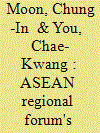

|
|
|
|
|
| Summary/Abstract |
The Association of Southeast Asian Nations Regional Forum has introduced the Experts and Eminent Persons system as a security affairs–related epistemic community in Asia Pacific. However, its performance has remained rather stagnant. This article assesses its performance by examining achievements and limitations of the system and identifies barriers to its effective functioning. The findings attribute its dismal performance to skewed composition and poor quality of membership, lack of depth and diversity of expertise and knowledge, absence of knowledge sharing or diffusion function, and negligible policy impact. The article suggests ways to improve the performance of the ARF-EEPs, and concludes by offering theoretical, empirical, and policy implications.
|
|
|
|
|
|
|
|
|
|
|
|
|
|
|
|
| 2 |
ID:
130707
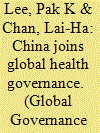

|
|
|
|
|
| Publication |
2014.
|
| Summary/Abstract |
In the wake of China's rapid ascendancy, are there any new rules made by the country in global health governance? This article examines China's emerging role in the Agreement on Trade Related Aspects of Intellectual Property Rights and finds that China adopts a pro-status quo stance on patented medicines. Aspiring to develop its own pharmaceutical sector to be capable to produce patented medicines on a par with the West, it has little appetite for using the prevailing rules or making new rules that are to the liking of the developing world. Undoubtedly, China is a new player in global health governance but has yet to have agenda-setting intent and capacity. This article argues that China's behavior and preferences can be explained by its dualistic national identities, the dominant position of realism in both the study of international relations and policy circles, and an underdevelopment of epistemic community in global health governance in the country.
|
|
|
|
|
|
|
|
|
|
|
|
|
|
|
|
| 3 |
ID:
174393
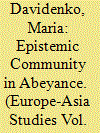

|
|
|
|
|
| Summary/Abstract |
This article examines how Russian NGOs in the field of domestic violence operate in a legal climate characterised by both state restriction and support. I conceptualise anti-violence NGOs that belong to a network as an ‘epistemic community’ and demonstrate that NGOs in my study faced challenges to the recognition of their expertise by state representatives and to the promotion of their vision of policy change. Yet, these NGOs continued to invest their resources in educational events for state specialists. I propose to theorise these educational events as a means of developing a knowledge-based network that can support domestic violence survivors despite lacking formal mechanisms of inter-agency collaboration.
|
|
|
|
|
|
|
|
|
|
|
|
|
|
|
|
| 4 |
ID:
103195
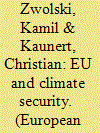

|
|
|
|
|
| Publication |
2011.
|
| Summary/Abstract |
This article analyses the development of the European Union (EU) as a global actor in the area of climate security. Building on this, it explicitly draws on constructivist concepts such as norm entrepreneurship and epistemic communities. To this end, it adopts the framework of epistemic communities, as developed by Peter Haas, in order to suggest that there is a group of EU officials, EU member states and think-tank activists, who drive the climate security agenda of the EU. Thus, it examines the precise actors involved in this EU epistemic community for climate security. This group promotes a reason for action at the global level, resulting in the attempt to diffuse this norm: climate change has consequences for international security; thus, it requires the development of appropriate policies and capabilities within the EU and globally. This article suggests that the epistemic community on climate security has been effective at diffusing this norm at both levels, albeit with differences.
|
|
|
|
|
|
|
|
|
|
|
|
|
|
|
|
| 5 |
ID:
108510
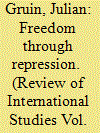

|
|
|
|
|
| Publication |
2011.
|
| Summary/Abstract |
A central concern of critical theory is that of how the forces of Modern reason cause certain logics to become reified in the name of rational progress. Two such logics - the ongoing spread of liberal capitalism, and territorial particularism - are simultaneously embodied within social institutions such as the World Trade Organization (WTO) that regulate the global economy, a phenomenon that occurs on the premise of maximising global welfare. Building upon a critical reading of Jürgen Habermas' theory of communicative action, this article undertakes an empirical immanent critique of the extent to which such logics repress the possibility of normative imperatives being considered within agricultural trade negotiations. Specifically, it argues that the dialectic of functionalist and communicative rationality, operating as a theoretical heuristic, reveals that the DDA is susceptible to an ethical indictment that arises from its inability to countenance the alternatives to the dual logics of neo-liberalism and state-interest that could otherwise emerge from a free and rational discussion. The nature of the WTO as a site of social action is revealed to be that of a closed epistemic community in which important normative claims are repressed, and as such, one in which the underlying rational bases for communication are fundamentally distorted.
|
|
|
|
|
|
|
|
|
|
|
|
|
|
|
|
| 6 |
ID:
141103
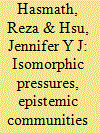

|
|
|
|
|
| Summary/Abstract |
This article suggests that the lack of meaningful collaboration between the state and NGOs in China is not solely a result of the state seeking to restrict the development of the sector, or the fear of a potential opposing actor to the state; instead, interviews with NGOs in Beijing and Shanghai suggest that a lack of meaningful engagement between the state and NGOs can be partially attributed to isomorphic pressures within state–NGO relations, and insufficient epistemic awareness of NGO activities on the part of the state. In fact, the evidence suggests that once epistemic awareness is achieved by the state, it will have a stronger desire to interact with NGOs – with the caveat that the state will seek to utilize the material power of NGOs, rather than their symbolic, interpretive or geographical capital.
|
|
|
|
|
|
|
|
|
|
|
|
|
|
|
|
| 7 |
ID:
151965
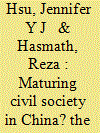

|
|
|
|
|
| Summary/Abstract |
This article suggests that Chinese NGOs do not have the conviction that they are part of an epistemic community in mainland China. Interviews conducted in four cities, Chongqing, Kunming, Nanjing and Shanghai, suggest that this can be attributed to a lack of set standards and professionalization governing their sector of operation. Further, the study finds that Chinese NGOs do not see knowledge production as their primary role within their organizational development life cycle. This may indicate a varying path towards the maturation of civil society in China, whereby Chinese NGOs do not conform to the organizational development process as outlined in extant NGO literature.
|
|
|
|
|
|
|
|
|
|
|
|
|
|
|
|
| 8 |
ID:
178691
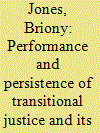

|
|
|
|
|
| Summary/Abstract |
Transitional justice, like other peacebuilding endeavours, strives to create change in the world and to produce knowledge that is useful. However, the politics of how this knowledge is produced, shared and rendered legitimate depends upon the relationships between different epistemic communities, the way in which transitional justice has developed as a field and the myriad contexts in which it is embedded at local, national and international levels. In particular, forms of ‘expert’ knowledge tend to be legal, foreign and based on models to be replicated elsewhere. Work on epistemic communities of peacebuilding can be usefully brought to bear on transitional justice, speaking to current debates in the literature on positionality, justice from below, marginalisation and knowledge imperialism. This article offers two contributions to the field of transitional justice: (1) an analysis of the way the field has developed as an epistemic community(ies) and the relevance of this for a politics of knowledge; and (2) an argument for the politics of knowledge to be more widely discussed and understood as a factor in shaping transitional justice policy and practice, and as a call to a more ethical relationship with the supposed beneficiaries of transitional justice interventions.
|
|
|
|
|
|
|
|
|
|
|
|
|
|
|
|
| 9 |
ID:
175822
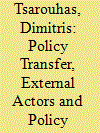

|
|
|
|
|
| Summary/Abstract |
Turkey’s economic turmoil of today is reminiscent of an earlier era, during which instability, high inflation, and financial mismanagement ruled the day. Yet until recently, Turkey was celebrated as an economic success story, enjoying rising prosperity, high GDP growth, and a healthy fiscal outlook. How was that success possible? Which mechanisms allowed for successful policy reform and how did internal reform dynamics interact with exogenous factors? This article examines the effects of EU and IFI policy conditionality on Turkey, arguing that EU-induced conditionality is more effective compared to IFI conditionality. Further, this work demonstrates the formation of a domestic epistemic community, which evolved into an advocacy coalition and became a crucial pillar for policy reform. Finally, shrewd policy entrepreneurs used a favorable window of opportunity and aligned with the reformist coalition to overcome barriers to policy change.
|
|
|
|
|
|
|
|
|
|
|
|
|
|
|
|
| 10 |
ID:
127795
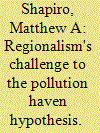

|
|
|
|
|
| Publication |
2014.
|
| Summary/Abstract |
This paper explores the phenomena of environmental coordination within Northeast Asia. I initially frame the discussion around claims that China is a pollution haven for its neighboring countries, and I look for evidence in the domestic and regional environmental institutions which challenge China's pollution haven status. I find that that there is a science and technology-based epistemic community in Northeast Asia which provides an important theoretical response to counter the pollution haven hypothesis. As well, given its strong science and technological output, Japan is poised to assume leadership of the Northeast Asian environmental regime for at least the short- to medium-term.
|
|
|
|
|
|
|
|
|
|
|
|
|
|
|
|
| 11 |
ID:
184659


|
|
|
|
|
| Summary/Abstract |
This article discusses how the institutionalization of international mediation practices and its growing relevance since the end of the Cold War coincided with the formation of an epistemic community that shares common practices for a third party. This community focuses on core concepts that structure mediation practices such as efficiency, rationality, and the management of time and information. The article analyzes the consolidation of this community through the circulation of knowledge among scholars and practitioners. In particular, it highlights the place of the concept of ripeness, developed by Ira William Zartman, in stabilizing a division between a moment of conflict and a moment of nonconflict; and it discusses the place of the UN system in its dissemination among mediation practitioners. The article argues that the project-oriented understanding of mediation practices that arises from these shared conceptions contributes to an insulation of these practices from broader views of conflict within international politics.
|
|
|
|
|
|
|
|
|
|
|
|
|
|
|
|
| 12 |
ID:
139243
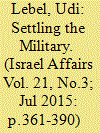

|
|
|
|
|
| Summary/Abstract |
The article describes the establishment of the pre-military academies in Judea and Samaria as cultural agents preceding the militaristic habitus of these areas. It follows the development of the security epistemic community in these areas which formed a new identity of the settlers. The increase of religious-Zionist youth in combat units and officer courses in the IDF due to these academies altered the positioning of the settlers and all religious Zionists in Israeli society vis-à-vis non-religious elites, the ultra-orthodox, and religious-Zionist groups who did not join the pre-military academy revolution. Judea and Samaria became a ‘security zone’ identified with sacrifice, heroism, giving, a pedagogical partnership with the army, reflected in higher percentages of activities in educational, religious, and cultural institutions encouraging meaningful army service.
|
|
|
|
|
|
|
|
|
|
|
|
|
|
|
|
| 13 |
ID:
143903
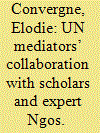

|
|
|
|
|
| Summary/Abstract |
UN mediators work more and more closely with academics and expertise-based non-governmental organizations, in particular through the Mediation Support Unit. The Organization appears to genuinely rely on them to conduct mediation and to strengthen its capacity in the area, to the point where it is sometimes difficult to operate a clear distinction between the two types of actors. This article analyzes why the practice of mediation today creates a demand for such expertise-focused cooperation. Beyond the need for flexibility and additional resources, the explanation lies in the prevailing feeling of uncertainty caused by today’s internal conflicts, for which the traditional state-centric lens is becoming irrelevant. In this context, the UN relies on knowledge produced by an epistemic community of peace and conflict scholars, and is embedded in a network of nongovernmental mediators with which it exchanges know-how, following the logic of communities of practice.
|
|
|
|
|
|
|
|
|
|
|
|
|
|
|
|
|
|
|
|
|